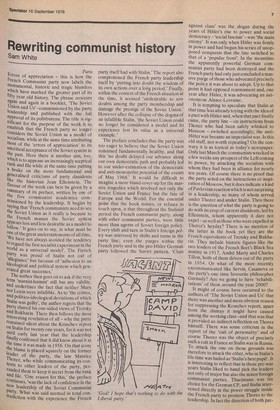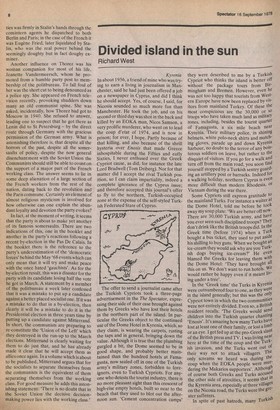Rewriting communist history
Sam White
Paris Errors of appreciation — this is how the French Communist party now labels the monumental, historic and tragic blunders Which have marked the greater part of its fifty year old history. The phrase reoccurs again and again in a booklet, `The Soviet Union and Us' —commissioned by the party leadership and published with the full approval of its politbureau. The title is significant for the purpose of the work is to establish that the French party no longer considers the Soviet Union as a model of socialism, while at the same time attributing most of the 'errors of appreciation' to its uncritical acceptance of the Soviet system in the past. Here there is another aim, too, Which is to appease an increasingly sceptical rank and file while at the same time putting a brake on the more fundamental and generalised criticisms of party dissidents like the historian Jean Ellenstein. The flavour of the work can best be given by a summary of its preface, written by one of the five communist academics commissioned by the leadership. It begins by saying that 'French communists need to see the Soviet Union as it really is because to the French masses the Soviet system aPPears less and less desirable as a model to follow.' It goes on to say, in what must be one of the great understatements of all time, We have not always avoided the tendency to regard the first socialist experiment in the world as a universal model'. The French Party was proud of Stalin not out of .allegiance' but because of 'adhesion to an Ideological and political system which generated great successes.'
The author then goes on to ask if the very term `marxist-leninist' still has any validity, and underlines the fact that neither Marx nor Lenin were infallible. As to 'the crimes, and politico-ideological deviations of which Stalin was guilty', the author regrets that the Party shared his one-sided views of Trotsky and Bukharin. There then follows the most interesting revelation of all — why the party remained silent about the Kruschev report on Stalin for twenty one years, for it was not until early last year that the leadership finally confessed that it did know about it at the time it was made in 1956. On that score the blame is placed squarely on the former leader of the party, the late Maurice Thorez, who while communicating its contents to other leaders of the party, persuaded them to keep it secret from the rank and file. 'One reason for this,' the preface continues, 'was the lack of confidence in the new leadership of the Soviet Communist Party. What was said seemed in total contradiction with the experience the French party itself had with Stalin.' The report also compromised the French party leadership itself by 'putting into doubt the wisdom of its own actions over a long period.' Finally, within the context of the French situation at the time, it seemed 'undesirable to sow doubts among the party membership and damage the prestige of the Soviet Union.'
However after the collapse of the dogma of an infallible Stalin, 'the Soviet Union could no longer be considered a model and its experience lost its value as a universal example.'
The preface concludes that the party was too eager to believe that the Soviet Union remained fundamentally healthy, and that this `no doubt delayed our advance along our own democratic path and probably led to our under-estimation of the democratic and anti-monopolist potential of the events of May 1968.' It would be difficult to imagine a more bland cover-up for the massive tragedies which involved not only the Soviet Union and France but the fate of Europe and the World. For the essential point that the book misses, or refuses to touch upon, is that throughout the Stalinist period the French communist party, along with other communist parties, were little more than agents of Soviet foreign policy. Every shift and turn in Stalin's foreign policy was mirrored by shifts and turns in the party line; even the purges within the French party and in the pre-Hitler German party followed the Soviet pattern. 'Class against class' was the slogan during the years of Hitler's rise to power and social democracy — 'social fascism' — was 'the main enemy'. It was only when Hitler was firmly in power and had begun his series of unopposed conquests that the line switched to that of a 'popular front'. In the meantime the apparently powerful German communist party had been destroyed and the French party had only just concluded a massive purge of those who advocated precisely the policy it was about to adopt. Up to that point it had opposed rearmament and, one year after Hitler, it was advocating an autonomous Alsace-Lorraine.
It is tempting to speculate that Stalin at that time !was already toying with the idea of a pact with Hitler and, when that pact finally came, the party line — on instructions from Thorez who had been safely whisked to Moscow — switched accordingly; the antiHitler war became an imperialist war. Is this old stuff, not worth repeating? On the contrary it is as topical as today's newspaper. Only last March the communists wrecked in a few weeks any prospect of the Left coming to power, by attacking the socialists with whom they had been in alliance for nearly ten years. Of course there is no proof that the party acted on the instructions or inspiration of Moscow, but it does indicate a kind of Pavlovian reaction which is not surprising in a leadership, so many of whom served under Thorez and under Stalin. Then there is the question of what the party is going to do with its crop of current dissidents, led by Ellenstein, whom apparently it dare not expel — as well as those who were expelled in Thorez's heyday? There is no mention of the latter in the book yet they are the French equivalents of Trotsky and Bukharin. They include historic figures like the two leaders of the French fleet's Black Sea mutiny in 1917, Andre Marty and Charles Tillon, both of them driven out of the party in 1954. Or what of the more recently excommunicated like Servin, Casanova or the party's one time favourite philosopher Garaudy? Are we going to have 'rehabilitations' of them around the year 2000?
It might of course have occurred to the authors of 'The Soviet Union and Us' that there was another and more obvious reason for suppressing the Kruschev report, apart from the dismay it might have caused among the working class —and that was that it provided an indirect reflection on Thorez himself. There was some criticism in the report of the 'cult of personality' and of course Thorez was the object of precisely such a cult in France as Stalin was in Russia. To attack the one on those grounds was therefore to attack the other, who in Stalin's life time was hailed as 'Stalin's best pupil'. It is interesting to reflect that in those pre-war years Stalin liked to hand pick the leaders not only of major but also the minor foreign communist parties. Thaelmann was his choice for the German CP, and Stalin intervened directly in the power struggle inside the French party to promote Thorez to the leadership. In fact the direction of both par ties was firmly in Stalin's hands through the comintern agents he dispatched to both Berlin and Paris; in the case of the French it was Eugene Fried, later liquidated by Stalin, who was the real power behind the seemingly doughty but in fact doughy exminer.
Another influence on Thorez was his woman companion for most of his life, Jeanette Vandermeersch, whom he promoted from a humble party post to membership of the politbureau. To fall foul of her was the short cut to being denounced as a police spy. She appeared on French television recently, provoking shudders down many an old communist spine. She was asked, incidentally, how Thorez had got to Moscow in 1940. She refused to answer, leading one to suspect that he got there as Lenin did to St Petersburg — by the direct route through Germany with the gracious permission of the German army. What is astonishing therefore is, that despite all the horrors of the past, despite all the somersaults of policy, despite the now general disenchantment with the Soviet Union the Communists should still be able to count on the support of a major part of the French working class. The answer seems to lie in some deep alienation of a large section of the French workers from the rest of the nation, dating back to the revolution and the Paris commune. Certainly an element of almost religious mysticism is involved for how otherwise can one explain the abundant loyalty and devotion the party evokes?
In fact, at the moment of writing, it seems that the party is about to make yet another of its famous somersaults. There are two indications of this, one in the booklet and another in the party's reactions following a recent by-election in the Pas De Calais. In the booklet there is the reference to the party's underestimation of the 'democratic forces' behind the May '68 events which can only mean that it will try and make peace with the once hated ‘gauchists'. As for the by-election result, this was a disaster for the party with its candidate losing half the vote he got in March. A statement by a member of the politbureau a week later confessed that it was a mistake to put up a candidate against a better placed socialist one. If it was a mistake to do that in a by-election, then clearly it will be a mistake to do it in the Presidential election in three years time by putting up a candidate against Mitterrand. In short, the communists are preparing to re-constitute the 'Union of the Left' which they destroyed in the run-up to the March elections. Mitterrand is clearly waiting for them to do just that, and he has already made it clear that he will accept them as allies once again. In a volume which is about to be published, Mitterrand argues that for the socialists to separate themselves from the communists is the equivalent of them separating themselves from the working class. For good measure he adds this astonishing statement: 'There is no doubt that in the Soviet Union the decisive decisionmaking power lies with the working class.'



































 Previous page
Previous page